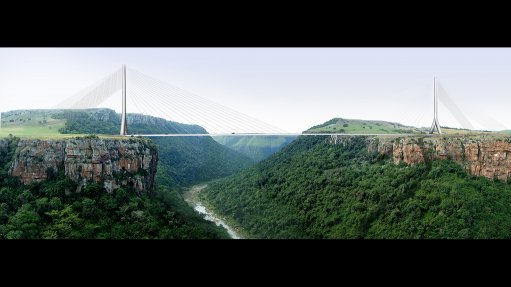
Name of the Project
N2 Wild Coast Toll Road (N2WCTR) megabridge projects.
Location
The bridges will be built over the Msikaba and Mtentu river gorges both near Lusikisiki, in South Africa’s Eastern Cape province.
The Msikaba bridge is located on the N2, which connects the Western Cape, Eastern Cape, KwaZulu-Natal and Mpumalanga provinces, and traverses the cities and major towns of Cape Town, George, Port Elizabeth, East London, Mthatha, Durban and Ermelo. This includes a brand-new greenfield section of 112 km between Port St Johns and Port Edward.
Project Owner/s
South African National Roads Agency Limited (Sanral).
Project Description
The Msikaba and Mtentu bridges form part of the N2WCTR project.
The 1.13-km-long Mtentu bridge, which includes a 260-m-long main span, will be one of the longest main-span-balanced cantilever bridges in the world. Only ten prestressed concrete girder bridges worldwide have a main span of 260 m or longer. Reaching heights of more than 220 m above the river valley, it will displace the Bloukrans bridge, in the Western Cape, as the highest bridge in Africa and the southern hemisphere. The 141-m-tall Pier No 9 will also be the tallest bridge pier in Africa and the southern hemisphere.
Being one of the longest main-span-balanced cantilever bridges and one of the highest bridges in the world makes the construction of the Mtentu bridge a technically highly challenging project. The remote location and local social dynamics add to this complexity.
The 580-m-long Msikaba bridge will be the longest main span – constructed using the cable-stayed method – bridge in Africa, and the second-longest main bridge span in Africa after the Maputo-Catembe suspension bridge, in Mozambique. With a deck height of 194 m above the river valley, Msikaba will become the third-highest bridge in Africa and the 133rd highest in the world. The Msikaba bridge cable-stay design will ensure that the construction of the bridge will have no direct impact on the pristine gorge environment almost 200 m below, which is one of the environmental requirements in building the bridge.
Potential Job Creation
Semiskilled and unskilled labour will be sourced locally. Local small, medium-sized and microenterprise (SMME) contractors and suppliers of goods and services will be used to meet the required contractor participation goals on the two projects, creating much-needed jobs and local economic development. The two megabridge projects, together with the seven adjacent roads packages, are expected to create about 8 000 full-time equivalent jobs during construction, while more than R2.8-billion will flow to SMMEs, the bulk of which will be from the OR Tambo and Alfred Nzo district areas, in the Eastern Cape.
A further 29 000 permanent direct and indirect jobs might also be created during the service period of the road once it is opened, Transport Minister Fikile Mbalula said on October 25, 2020.
Capital Expenditure
The Msikaba bridge project will cost an estimated R1.65-billion and the Mtentu bridge project R2.5-billion.
Planned Start/End Date
The N2WCTR project started in 2011; however, the major greenfield portion of the route between Port St Johns and Port Edward started only in 2016.
Provided that there are no significant delays on the Mtentu bridge project, the construction period is estimated to be 49 months, including a four-month mobilisation period.
The Msikaba bridge project is in the early construction phase, following an extended initial ramp-up period. Construction started in January 2019 and is expected to be completed by the end of 2023.
Latest Developments
The Msikaba bridge is currently under construction, with a temporary cable car installed at the bridge site now fully operational.
The cable car significantly reduces the travelling time between the south and north sites of the Msikaba. The distance between the north and south banks of the Msikaba bridge site is about 600 m, but is currently accessible only through an almost three-hour, 96 km drive. The cable car will enable site staff to cross the gorge in an estimated three to four minutes.
The cable car can carry up to 500 kg, transport site staff and occasionally small quantities of material, such as laboratory samples, from the south to the north bank and vice versa.
The tender for the Mtentu bridge project has closed and is in adjudication. A contractor is expected to be appointed by September 2021.
Key Contracts, Suppliers and Suppliers
Concor Mota-Engil JV (Msikaba bridge contract); HVA Joint Venture (Msikaba and Mtentu bridge consultants comprising CH2M and SMEC); V3 Consulting Engineers (lead consultant – Ndwalane to Ntafufu and Kulumbe to Mtamvuna river); ERO Engineers (lead consultant – Ntafufu to Bambisana turn-off); Naidu Consulting (lead consultant – Bambisana turn-off to Lingeni); Aurecon Rohm consortium (lead consultants – Lingeni to Msikaba); Knight Piesold (lead consultant – Msikaba to Mtentu) and KBK Engineers (lead consultant – Mtentu to Kulumbe).
Contact Details for Project Information
Sanral project manager Craig McLachlan, tel +27 41398 3200 or email MclachlanC@nra.co.za, or for technical aspects Sanral bridge network manager Edwin Kruger, tel +27 12 844 8000.